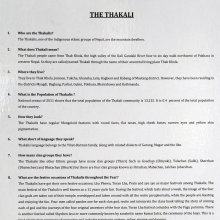Tar, Tār, Ṭar: 9 definitions
Introduction:
Tar means something in Hinduism, Sanskrit, the history of ancient India, Hindi, biology, Tamil. If you want to know the exact meaning, history, etymology or English translation of this term then check out the descriptions on this page. Add your comment or reference to a book if you want to contribute to this summary article.
Images (photo gallery)
India history and geography
Source: Cologne Digital Sanskrit Dictionaries: Indian Epigraphical GlossaryTār.—(SII 1), name of a silver coin, equal to (1/6) of a gold fanam. Note: tār is defined in the “Indian epigraphical glossary” as it can be found on ancient inscriptions commonly written in Sanskrit, Prakrit or Dravidian languages.
--- OR ---
Tār.—name of a silver coin, equal to (1/6) of a gold fanam. Note: tār is defined in the “Indian epigraphical glossary” as it can be found on ancient inscriptions commonly written in Sanskrit, Prakrit or Dravidian languages.

The history of India traces the identification of countries, villages, towns and other regions of India, as well as mythology, zoology, royal dynasties, rulers, tribes, local festivities and traditions and regional languages. Ancient India enjoyed religious freedom and encourages the path of Dharma, a concept common to Buddhism, Hinduism, and Jainism.
Biology (plants and animals)
Source: Google Books: CRC World Dictionary (Regional names)1) Tar in India is the name of a plant defined with Corypha umbraculifera in various botanical sources. This page contains potential references in Ayurveda, modern medicine, and other folk traditions or local practices It has the synonym Bessia sanguinolenta Raf. (among others).
2) Tar is also identified with Borassus flabellifer It has the synonym Pholidocarpus tunicatus H. Wendl. (etc.).
3) Tar is also identified with Phoenix sylvestris It has the synonym Elate versicolor Salisb. (etc.).
4) Tar in Papua New Guinea is also identified with Bixa orellana It has the synonym Bixa urucurana Willd. (etc.).
Example references for further research on medicinal uses or toxicity (see latin names for full list):
· Fl. Cochinch. (1790)
· Tropical and Geographical Medicine (1991)
· Methods and Findings in Experimental and Clinical Pharmacology (2008)
· Taxon (1970)
· Webbia (1914)
· Species Plantarum, ed. 3
If you are looking for specific details regarding Tar, for example side effects, health benefits, extract dosage, diet and recipes, chemical composition, pregnancy safety, have a look at these references.

This sections includes definitions from the five kingdoms of living things: Animals, Plants, Fungi, Protists and Monera. It will include both the official binomial nomenclature (scientific names usually in Latin) as well as regional spellings and variants.
Languages of India and abroad
Sanskrit dictionary
Source: Cologne Digital Sanskrit Dictionaries: Cappeller Sanskrit-English DictionaryTar (तर्).—[masculine] (only [nominative] [plural] tāras) star.
[Sanskrit to German]
Sanskrit, also spelled संस्कृतम् (saṃskṛtam), is an ancient language of India commonly seen as the grandmother of the Indo-European language family (even English!). Closely allied with Prakrit and Pali, Sanskrit is more exhaustive in both grammar and terms and has the most extensive collection of literature in the world, greatly surpassing its sister-languages Greek and Latin.
Hindi dictionary
Source: DDSA: A practical Hindi-English dictionaryTar in Hindi refers in English to:—(a) wet, soaked; damp, dank; fresh; a suffix used to denote comparative degree (as [uccatara, mahattara, behatara]); rich (as food etc.—[tara mala]); -[ba-tara] soaked, drenched; -[o-taja] freshed, refresh, revived; —[karana] to soak, to drench; to refresh..—tar (तर) is alternatively transliterated as Tara.
...
Kannada-English dictionary
Source: Alar: Kannada-English corpusṬār (ಟಾರ್):—[noun] = ಟಾರು [taru].
--- OR ---
Tar (ತರ್):—
1) [verb] to carry, convey, conduct or to come with, to or toward the speaker or to the place implied.
2) [verb] to cause (a person) come in or to bring along with oneself.
3) [verb] to give, offer (something) to.
4) [verb] to hold out or reach out.
5) [verb] to bring out or forth.
6) [verb] to cause to happen.
7) [verb] to decide or take a decision.
8) [verb] to cause to get married; to arrange to have close relationship as by a marriage.
9) [verb] to bring a girl or woman by marriage, as one’s wife, daughter-in-law, etc.
10) [verb] ತಂದಿಕ್ಕು [tamdikku] tandikku to earn and bring something 2. to feed; to serve (food); 3. to knock down or fell (as in a combat); 4. to cause (two or more things) to mingle together; to blend; 5. to cause rift, misunderstanding, quarrel etc. between two persons; ತಂದಿಡು [tamdidu] tandiḍu = ತಂದಿಕ್ಕು [tamdikku]; ತಂದುಕೊಳ್ಳು [tamdukollu] tandukoḷḷu to cause (a person) to come (in or towards oneself); 2. to have or get; 3. to bring home a girl or woman (after marriage) as wife, daughter-in-law, etc.; ತಂದುಹಾಕು [tamduhaku] tandu hāku to bring (money) as a reward for one’s labour, service, etc.; to earn; 2. to cause a dispute, disagreement, etc.; ತಂದೊಡ್ಡು [tamdoddu] tandoḍḍu to make another a target for being blamed or make responsible (usu. with intent to harm); 2. to cause to happen or create a situation for something to happen.
--- OR ---
Tār (ತಾರ್):—[noun] a thing or happening supposed to foretell a future event, either good or evil; augury; an omen.
--- OR ---
Tāṟ (ತಾಱ್):—[verb] = ತಾಱು [taru]1.
--- OR ---
Tāṟ (ತಾಱ್):—[noun] a thing or happening supposed to foretell a future event, either good or evil; augury; an omen.
Kannada is a Dravidian language (as opposed to the Indo-European language family) mainly spoken in the southwestern region of India.
Tamil dictionary
Source: DDSA: University of Madras: Tamil LexiconṬar (டர்) noun < Hindustain ḍar. Fear; பயம். [payam.] (W.)
--- OR ---
Tār (தார்) noun cf. dhṛ.
1. Wreath, garland, chaplet; மாலை. (பிங்கலகண்டு) [vaithiya malaiyagarathi (pingalagandu)]
2. Flower, blossom; பூ. (பிங்கலகண்டு) [pu. (pingalagandu)]
3. Flower-bud; பூவரும்பு. கடைதிறக்குந் தார்கண்ட வண்டும் [puvarumbu. kadaithirakkun tharkanda vandum] (வெங்கைக்கோ. [vengaikko.] 65).
4. Cluster of flowers; பூங்கொத்து. தாரார் கரந்தை மலைந்து [pungothu. tharar karanthai malainthu] (புறப்பொருள்வெண்பாமாலை [purapporulvenpamalai] 2, 1).
5. String of bells for a horse; கிண் கிணி மாலை. பாய்மா வரும் பொற்றா ரரவத்தாலே [kin kini vaithiya malaiyagarathi payma varum porra raravathale] (சீவகசிந்தாமணி [sivagasindamani] 1819).
6. Chain; சங்கிலி. ((சங்கத்தகராதி) தமிழ்சொல்லகராதி) [sangili. ((sangathagarathi) thamizhsollagarathi)]
7. Neck-stripes of parrots; கிளியின் கழுத்துவரை. செந்தார்ப் பசுங்கிளியார் [kiliyin kazhuthuvarai. sentharp pasungiliyar] (சீவகசிந்தாமணி [sivagasindamani] 1036).
8. Van of an army; கொடிப்படை. தாரொடு பொலிந்த . . . மூத்த புரிசை [kodippadai. tharodu polintha . . . mutha purisai] (பத்துப்பாட்டு: மலை [pathuppattu: malai] 227).
9. Rank and file of an army, troops; சேனை. (சூடாமணிநிகண்டு) தாரொடுங்கல் செல்லா [senai. (sudamaninigandu) tharodungal sella] (கம்பராமாயணம் மந்தரை. [kambaramayanam mantharai.] 13).
10. Orderliness; ஒழுங்கு. தாரருந் தகைப்பின் [ozhungu. thararun thagaippin] (பதிற்றுப்பத்து [pathirruppathu] 64, 7).
11. cf. தாறு¹. [tharu¹.] See தார்க்குச்சு¹. (அகராதி நிகண்டு) [tharkkuchu¹. (agarathi nigandu)]
12. [Telugu: dāramu.] Cord; கயிறு. அருளெனு நலத்தார் பூட்டி [kayiru. arulenu nalathar putti] (பதினொராந்திருமுறை பட்டணத். கோயினா. [pathinorandirumurai pattanath. koyina.] 16).
13. Mane; பிடர் மயிர். தாரணியெருத்தின் அரிமான் [pidar mayir. tharaniyeruthin ariman] (பதிற்றுப்பத்து [pathirruppathu] 12, 4).
14. A kind of drum; தோற்கருவிவகை. பம்பைதார் முரசம் [thorkaruvivagai. pambaithar murasam] (கம்பராமாயணம் பிரமாத். [kambaramayanam piramath.] 5).
15. Land inside a tank, used for dry cultivation; ஏரி உள் வாயிலுள்ள புன்செய். எனக்கு அந்தத் தாரைக் காட்டி னான். [eri ul vayilulla punsey. enakku anthath tharaig katti nan.]
16. Trick, tactical move; உபாயம். ஒரு கால் வருதார்தாங்கி [upayam. oru kal varutharthangi] (புறநானூறு [purananuru] 80).
--- OR ---
Tār (தார்) particle < Urdu dār < dhārin. A termination indicating owner; உடைமையைக் குறிக்கும் ஒரு சொல். ஜாகீர்தார், இனாந்தார். [udaimaiyaig kurikkum oru sol. jagirthar, inanthar.]
--- OR ---
Tār (தார்) noun < English tār. Liquid or wood tar, pitch, Pix liquido; கீலெண்ணெய். [kilenney.] Local usage
--- OR ---
Tār (தார்) noun perhaps from dharā. House; வீடு. [vidu.]
Tamil is an ancient language of India from the Dravidian family spoken by roughly 250 million people mainly in southern India and Sri Lanka.
Nepali dictionary
Source: unoes: Nepali-English DictionaryTar is another spelling for टार [ṭāra].—n. level plot of ground; plateau; tableland;
Nepali is the primary language of the Nepalese people counting almost 20 million native speakers. The country of Nepal is situated in the Himalaya mountain range to the north of India.
See also (Relevant definitions)
Starts with (+1877): Jarenere, Tar ganga, Tar tree, Tar-ceyalay, Tar-cirappupayiram, Tar-invalnan, Tar-kattarkatutaci, Tar-mardi, Tar-poruttuporul, Tar-taray, Tar-vine, Tara, Tara kanchi, Tara lota, Tara manang, Tara taba, Tara-deya, Tara-dinu, Tara-Kana-Kara-Dini-Dishi, Tara-mira.
Ends with (+1861): Abalamkartar, Abhettar, Abhibadhitar, Abhibhashitar, Abhidhatar, Abhigantar, Abhigoptar, Abhigrahitar, Abhihartar, Abhijjhatar, Abhijjhitar, Abhikhyatar, Abhikshattar, Abhimantar, Abhinanditar, Abhinetar, Abhipratar, Abhipravarshayitar, Abhirakshitar, Abhisartar.
Full-text (+512): Dar, Tarttayilam, Tarkkalimpu, Tarenney, Tar-taray, Tarkkulal, Varcutar, Darayya, Kilenney, Hakkutar, Tarmaram, Tarvanku, Paintar, Tarkkuccu, Yomiyatar, Tarkkapparai, Tar-invalnan, Tarati, Taritu, Tarayana.
Relevant text
Search found 71 books and stories containing Tar, Tār, Ṭār, Tāṟ, Ṭar, Thar, Thaar, Dar, Dhar; (plurals include: Tars, Tārs, Ṭārs, Tāṟs, Ṭars, Thars, Thaars, Dars, Dhars). You can also click to the full overview containing English textual excerpts. Below are direct links for the most relevant articles:
Blue Annals (deb-ther sngon-po) (by George N. Roerich)
Chapter 13 - Staglungpa (iii): Stays at other monasteries < [Book 8 - The famous Dakpo Kagyü (traditions)]
Chapter 4 - Yamāntaka Cycle < [Book 7 - The preaching of the Tantras]
Chapter 13 - Staglungpa (vii): Maṅgala guru < [Book 8 - The famous Dakpo Kagyü (traditions)]
Guhyagarbha Tantra (with Commentary) (by Gyurme Dorje)
8. Appearance and Translation of the Māyājāla Cycle in Tibet < [Introduction]
Commentary 1-2: Teachings on the Wrathful Deities < [Chapter 15 (Text and Commentary)]
Text 15.33 (Commentary) < [Chapter 15 (Text and Commentary)]
Tiruvaymoli (Thiruvaimozhi): English translation (by S. Satyamurthi Ayyangar)
Pasuram 4.2.7 < [Section 2 - Second Tiruvaymoli (Palan ay, El ulaku untu)]
Iqbal-An Appreciation < [May 1939]
Darkness < [July – Sept. & Oct. – Dec. 1992]
Tony Morrison -Nobel Laureate of 1993 < [January – March, 1994]
Bodhisattvacharyavatara (by Andreas Kretschmar)
The History of Dzongsar Shedra in East Tibet < [Introduction Text]
Text Sections 130-131 < [Khenpo Chöga’s Oral Explanations]
Reverberations of Dharmakirti’s Philosophy (by Birgit Kellner)
Related products


